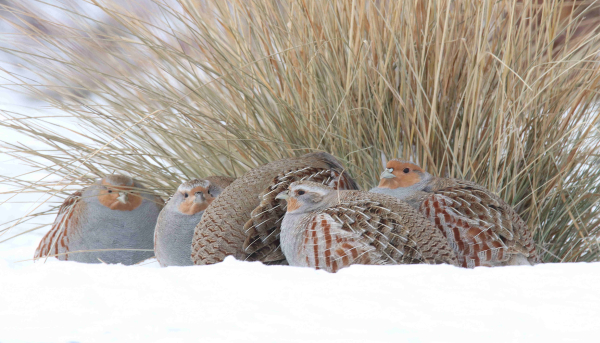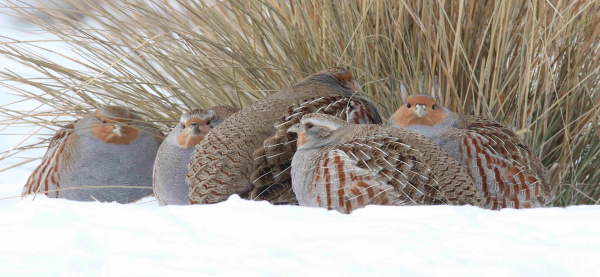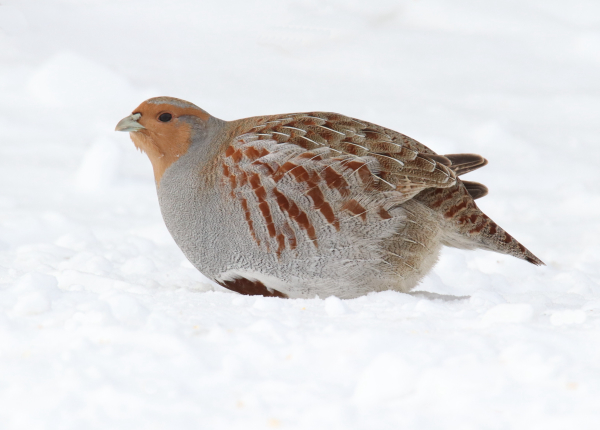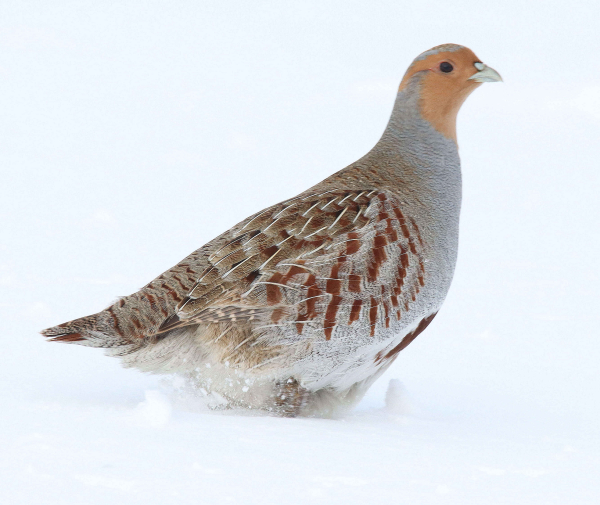While I’ve mentioned my interest in a little population of Gray Partridges that inhabit a growing neighborhood on the edge of Fargo that I’ve been monitoring and photographing during the past 18 months, they continue to provide some fun opportunities to study and take a few photos season after season. Eventually I will have a file of photos that illustrate the life history of the species. I’m almost at that point now, but there was one partridge scene missing: A photo of a covey resting together, shoulder to shoulder.

The location is in the neighborhood where my niece Krista and nephew Casey had their new house built. It borders a large open field with short-cropped grass and native plants, new houses with open lots here and there, an elementary school, playgrounds, and open space with small wetlands and walking and cycling trails. The partridges seem to use all of these areas and my 3 young nephews enjoy it when they see the partridges walk through their yard or adjacent lots, and during summer they saw family groups forage outside their windows occasionally.

Recently, after a new snowfall, I stopped in to see if I could find some partridges and possibly get some photos of them in the snow. During that cold afternoon visit I first noticed a female Gray Partridge resting beneath a stand of golden grass surrounded by the new snow. After stopping and taking a couple photos from the street, another partridge materialized from behind the tall grasses, then another and another. Within moments 8 Gray Partridges calmly walked along the side of a house, turned the corner, and to my surprise began scratching in the snow to find seeds that the home owners apparently scattered for the birds before the snowfall.
It was quite fun to watch the antics and interactions of the partridges, but I was a bit self-conscious about photographing as I was parked in the street in front of someone’s front yard, so after a few minutes I resumed my search for other birds, including other partridges. After 20 minutes or so, I returned to the front yard, where I was delighted to see that many of the partridges were resting, shoulder to shoulder in front of the tall grass, surrounded by fresh snow, huddled together while looking like circular balls of feathers, each with a tiny head and eyes on top. It was just the opportunity I was hoping for, for years, and I stopped my car and began photographing the covey as they rested after their feeding session.

Although the sun was occasionally breaking through light clouds, as I photographed the sunlight was dimmed a bit by the clouds, which actually was a plus. Because the sun was low and positioned mostly behind and to the left of the partridges, the light clouds eliminated shadows that would have ruined the photo quality. Everything came together, and with most of the partridges facing in my direction, the covey made for a few quaint, tranquil-looking photographs that I really appreciate.

Hustling through the shallow snow, this Gray Partridge shows a more normal body shape for the species in comparison to its fluffed up companions in the other photographs (600mm zoom, f-8 aperture, 1/500 shutter speed, 800 ISO).
|
I remember my friend and mentor Ed Bry had a photograph he took of a covey of Gray Partridges positioned shoulder to shoulder in a circle in the snow, all touching with their tails touching in the center and their faces looking outward; an image I’ve never seen repeated. But while my photographs of this covey are a bit different, they have some unique elements and subtle colors that make them special images that add much to the story I can tell with my file of life history photographs of Gray Partridges.
Observing and photographing these birds has added a nice dimension to my visits to Fargo, which are more regular now that most of my family moved there from Florida last summer. It is my hope that you always take advantage of photographing birds through the seasons, and now is prime time for taking winter photographs of the birds in your area, or that you encounter on birding adventures. Good Luck!
Article and Photographs by Paul Konrad
Share your bird photos and birding experiences at editorstbw2@gmail.com